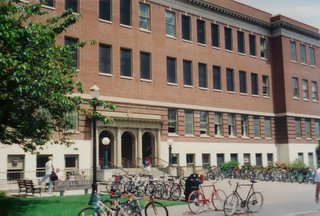DEC, Council appointments, and "the money trail starts here."

Between the time I posted an alert yesterday about "cleaning rules" on board, and this morning, DEC backed off some nutty proposed "3 day rule."
I went to school in these buildings at OSU. They are connected with the annual Micro-Canners Conference in Oregon. Click here. For more small processing info from U. of A. Click here.
The DEC person I finally talked to said they should have done a better job of notification. How about a better job of talking to fishermen FIRST? The RSDAs can't get rolling fast enough to head off this kind of strong-arming.
Speaking of strong-arming, here's an article on "Reauthorization" of the Magnuson-Stevens Fishery Management and Conservation Act that is working it's way through Congress now.
Fishery council appointments: Currently, there are no conservationists on the PFMC. The bill would require the appointment (by the Secretary of Commerce) of some council members who are "representatives of the public interest in marine fish conservation, including individuals who do not derive any of their annual income from commercial or recreational fishing." The existing law requires council members to be participants in the fishing industry in one way or another, on the belief these individuals know the issues, the industry and the oceans best. The proposed change might not result in the appointment of any environmentalists, but, says DeFalco, it would be good if the regional councils added retired noncommercial anglers or state fish and wildlife officials - "somebody without a financial interest in the industry."
Yeah, that would be good! But, you know, nobody is going to do the "good" thing unless they are MADE to. Admiral James Watkins, U.S. Navy (Retired), Chairman of the U.S. Commission on Ocean Policy endorsed the need for independent science. That includes economic impact analysis by Doctorates advising Alaska and the North Pacific Fisheries Management Council. Why did Alaska have to hire an economist from Pullman, WA instead of the University of Alaska? And a university that takes in huge chunks of money from the large shore-based seafood processors and their association.
Washington State University is even doing the research on the new "canning" technology. A "Processor's University." So how can you think that an economist from there, who pushed giving living seafood resources in perpetuity to the owners of shore plants, is independent? A fisherman/researcher drove over to Pullman and got an interview on tape with the "rationalization" economist. Eventually he showed his stripes when he called fishermen greedy S.O.B.s. Actually he called them "those most egregious rent seekers." Same thing.
I remember when Anchorage was going through the burst housing bubble thing in the mid '80s. There was an economist for Key Bank that had a daily column in the Anchorage Daily News. The more the market imploded, the more adamant he was that there was no cause for alarm. People were turning in their keys to different banks and streaming down the AlCan Highway. I was watching if he would ever change his tune. He never did. His column just disappeared when the banks started toppling like dominoes. Was he paid to say what he did. I think so. He was a literate man.
How can an irrational process produce "rationalization"? Here's a few rules that should be adopted by, and they know who they are. First, fisheries advisors to elected officials shouldn't be allowed to make public statements. Second, fishermen's group leaders need to have "clean hands." Third, economists can't be frothing fishermen haters. Fourth, Fisheries Management Council members must recuse themselves on matters that would enrich themselves or their employers. And you could put a limit on that, say $25 million a pop. That would pay for their time on the Council good enough I would think.


<< Home